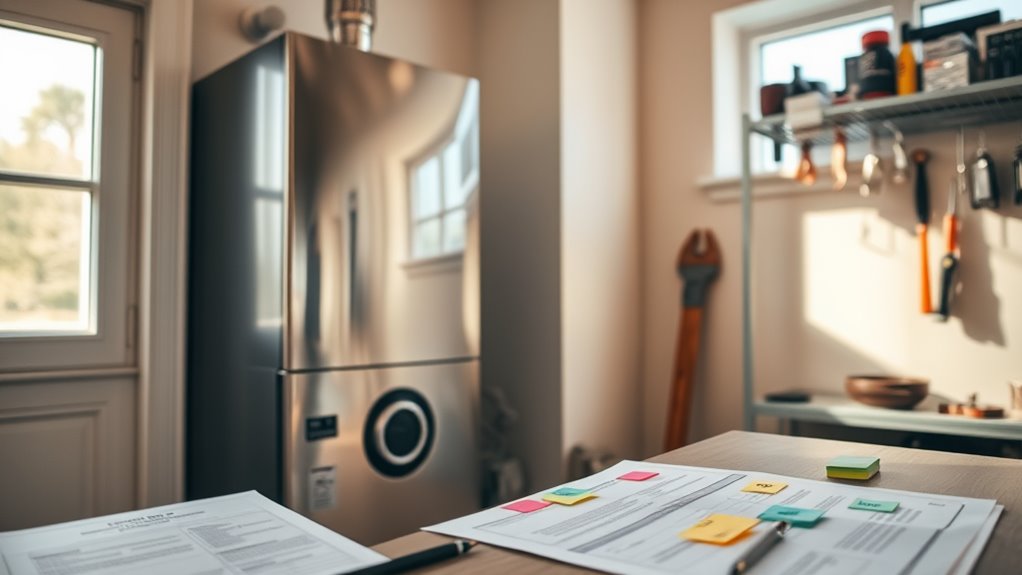Yes, you can qualify for grants and funding to help cover the costs of a new boiler. Various government and local programs offer financial assistance, especially targeting low-income households. Eligibility often depends on income levels, property types, and current heating efficiency standards. By exploring available options and understanding the application process, you can greatly reduce the installation expense. If you're curious about specific grants and the steps to secure funding, there's more information available on this topic.
Key insights
- Various government and local programs offer grants to assist homeowners in upgrading to energy-efficient boilers.
- Eligibility often depends on income thresholds and specific property types, such as residential homes.
- Some grants are designed specifically for low-income households to alleviate financial burdens.
- Research local initiatives as funding amounts and requirements can vary by region.
- Proper maintenance of current heating systems may enhance chances of receiving financial assistance.
Understanding Boiler Grants and Funding Options
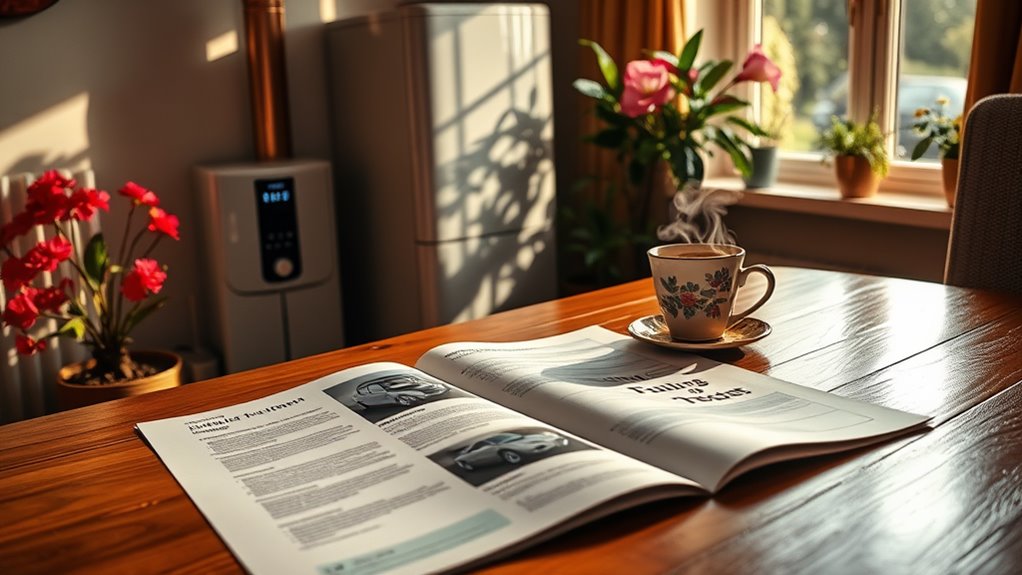
When considering a new boiler, understanding the available grants and funding options can greatly ease the financial burden. Various funding sources, including government programs and local initiatives, aim to support homeowners like you in upgrading to more energy-efficient systems. These grants often cover a significant portion of the installation costs, making it easier to invest in a new boiler. You should also factor in boiler maintenance, as proper upkeep can prolong the life of your unit and reduce long-term expenses. Regular maintenance ensures that your heating systems meet current safety and environmental standards, which can also play a role in eligibility for certain grants. Researching available programs in your area is essential, as eligibility requirements and funding amounts can vary. By exploring these options, you can make a more informed decision and alleviate some of the financial strain associated with purchasing a new boiler.
Eligibility Criteria for Boiler Grants
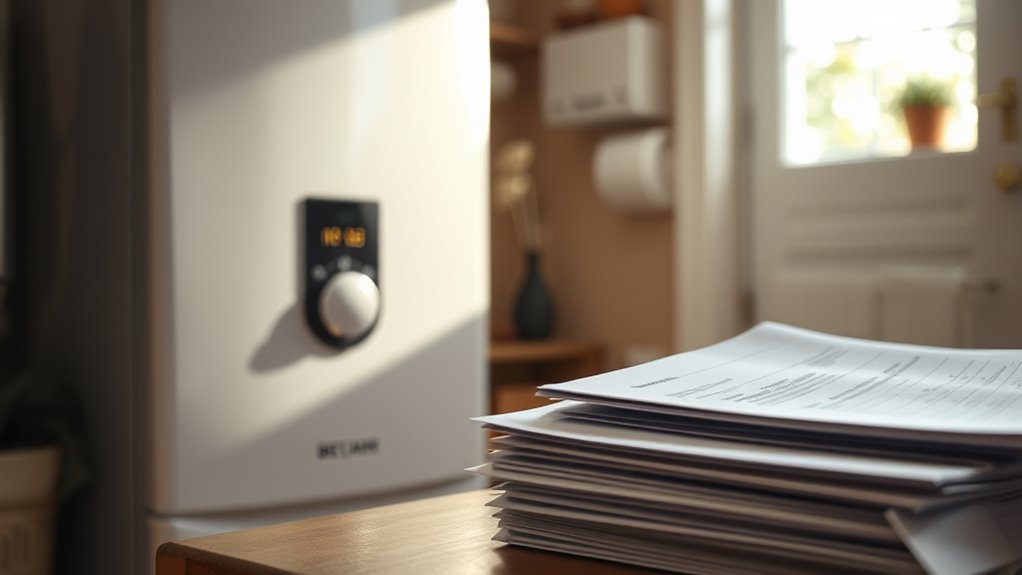
To qualify for boiler grants, you must meet specific criteria set by funding organizations, which often include income thresholds, property type, and energy efficiency standards. Understanding these eligibility factors is essential for your grant application success. Here's a breakdown of common grant eligibility criteria:
- Income Requirements: Your household income must fall below a certain threshold.
- Property Type: Grants typically apply to specific property types, such as residential homes.
- Energy Efficiency Standards: Your current heating system may need to meet minimum efficiency ratings.
- Location: Some grants are only available in designated areas or regions. Additionally, ensuring compliance with Commercial Gas Safety Certificates can enhance your chances of receiving funding.
Types of Grants Available for Boiler Replacement

While exploring options for boiler replacement, you'll find several types of grants designed to assist homeowners in upgrading their heating systems. One significant source of funding comes from government initiatives, aimed at promoting energy efficiency and reducing carbon emissions. These grants often target low-income households, providing financial relief through low income assistance programs. Additionally, state and local governments may offer specific grants tailored to residents, which can vary in amount and eligibility criteria. Some utilities also provide rebates or incentives for those replacing old boilers with energy-efficient models. By understanding these options, you can better navigate the landscape of financial aid available for your boiler replacement project, ensuring you secure the assistance you need. Regular servicing ensures safe and efficient operation, reducing the overall costs associated with boiler maintenance and potential repairs.
How to Apply for a Boiler Grant
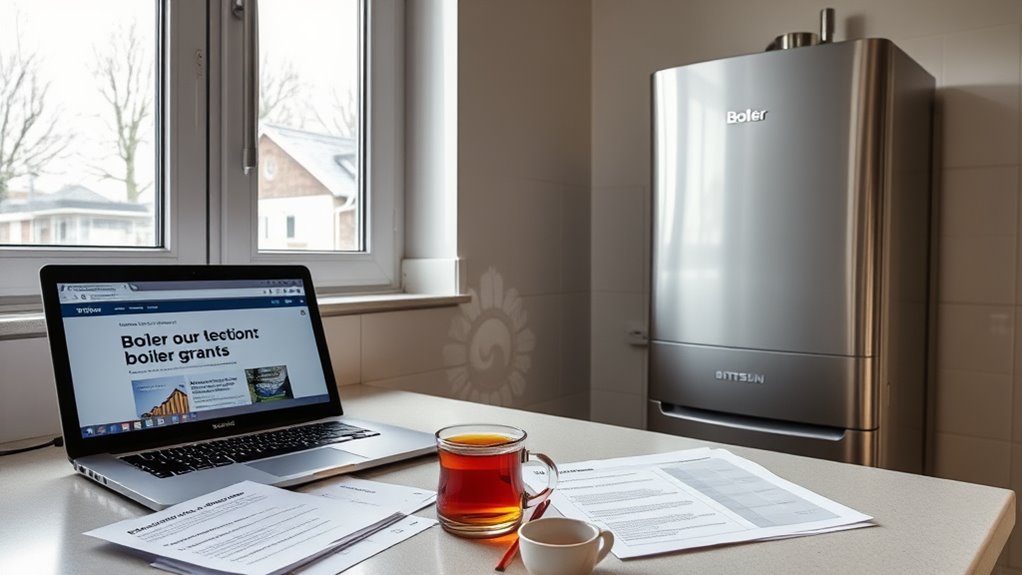
Understanding the types of grants available is just the first step; knowing how to apply for a boiler grant can greatly enhance your chances of receiving financial assistance. To navigate the application process effectively, follow these steps:
- Research: Identify the specific grants that match your needs and check the grant requirements.
- Gather Documentation: Collect necessary documents, such as proof of income and property ownership.
- Complete the Application: Fill out the application form accurately, ensuring all information is complete and truthful.
- Submit and Follow Up: Send your application by the deadline and follow up to confirm it was received. Regular maintenance of HVAC systems can improve the efficiency of your new boiler and may also be considered in some grant applications.
Additional Financial Assistance Programs
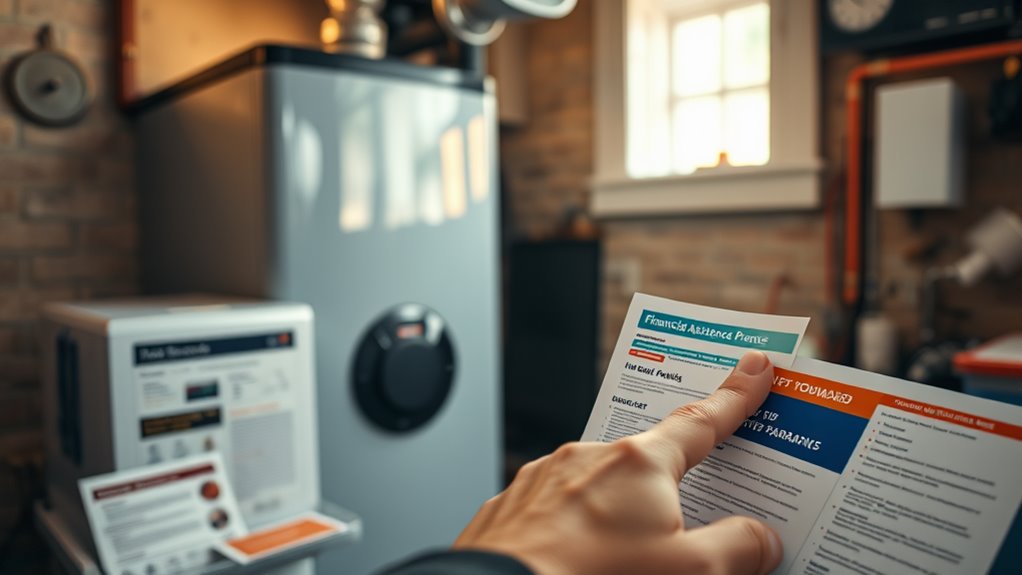
If you're seeking financial support beyond boiler grants, several additional assistance programs can help alleviate the costs of home heating improvements. Local community resources often provide utility assistance, helping you manage monthly bills to avoid sudden financial strain. Programs like the Low-Income Home Energy Assistance Program (LIHEAP) offer direct funding for heating costs, ensuring your home remains comfortable without breaking the bank. Additionally, exploring nonprofit organizations can reveal options for low-interest loans or rebates on energy-efficient upgrades. Enhancing your financial literacy is essential; understanding these resources empowers you to make informed decisions. By leveraging these programs, you can greatly lower your heating expenses and invest in a sustainable, efficient home heating solution. Furthermore, utilizing energy-efficient heating systems can lead to significant long-term savings, making your home more economical and environmentally friendly.
Tips for Choosing the Right Boiler for Your Home
When selecting the right boiler for your home, it's essential to understand the different types available and their respective energy efficiency ratings. You'll also need to size your boiler correctly to guarantee peak performance and comfort. Regular maintenance helps prevent common error codes and enhances boiler longevity. This guide will help you navigate these key factors effectively.
Boiler Types Overview
Choosing the right boiler for your home involves examining various types that cater to different heating needs and preferences. Here's an overview of common boiler types:
- Combi Boilers: Efficient and compact, these heat water on demand, saving space and energy.
- System Boilers: Ideal for larger homes, they provide a constant supply of hot water and require a separate cylinder.
- Regular Boilers: Best for homes with traditional heating systems, these need a separate hot water tank and are known for their reliability.
- Condensing Boilers: Highly efficient, they capture waste heat, reducing energy bills and environmental impact.
Keep in mind that boiler efficiency and regular boiler maintenance are essential for peak performance and longevity. Choosing a boiler that complements your heating system can also help enhance heating system efficiency. Choose wisely to meet your heating needs!
Energy Efficiency Ratings
Understanding energy efficiency ratings is essential for selecting the right boiler for your home, as these ratings directly impact your energy costs and environmental footprint. Boilers are evaluated using rating scales like the Annual Fuel Utilization Efficiency (AFUE) and the Energy Efficiency Rating (EER). A higher AFUE percentage means the boiler converts more fuel into heat, resulting in lower energy bills. Similarly, the EER measures cooling efficiency for boilers with integrated air conditioning. When shopping for a boiler, aim for models with high efficiency ratings to maximize savings and minimize your environmental impact. Don't forget to take into account local regulations and available grants, as energy-efficient models may qualify for financial assistance, making your investment even more worthwhile. Regular maintenance, including monitoring pressure levels, is crucial to ensure optimal boiler performance and longevity.
Sizing Your Boiler
Selecting the right boiler for your home hinges on accurate sizing, as an improperly sized unit can lead to inefficiencies and increased costs. To guarantee you meet your heating requirements effectively, consider the following tips:
- Assess Boiler Capacity: Calculate your home's square footage and heating needs.
- Look at Insulation: Well-insulated homes may require less capacity, while poorly insulated homes need more.
- Evaluate Hot Water Needs: Consider how much hot water you use daily; this impacts boiler size.
- Consult Professionals: Don't hesitate to ask heating experts for a proper assessment, ensuring you choose the best fit. Additionally, understanding error codes can help identify any issues that arise with your boiler after installation.
Frequently Asked Questions
Can I Receive Multiple Grants for the Same Boiler Replacement?
You might wonder if you can receive multiple grants for the same boiler replacement. Generally, grant eligibility varies by program, and many don't allow stacking multiple grants for the same project to avoid overfunding. However, if you're facing high boiler costs, it's essential to research specific grants available in your area. Always check the guidelines of each grant to understand their policies on combining funding for your boiler replacement.
How Long Does It Take to Receive Grant Approval?
The grant approval timeline can vary considerably based on several factors, including the specific grant program and your application's completeness. Generally, grant processing can take anywhere from a few weeks to several months. To expedite approval, make certain you provide all required documentation and adhere to deadlines. Staying in touch with the grant provider can also help you track your application's status and address any potential issues early in the process.
Are There Specific Brands or Models Covered by Grants?
When considering grants for heating systems, you'll often find specific boiler brands and model eligibility criteria outlined in the program details. Not all brands qualify, so it's crucial to research which ones are approved. Check your local grant program's website or contact them directly for a list of eligible models. This guarantees that when you apply, you're selecting a boiler that meets the necessary requirements and increases your chances of funding approval.
Can I Apply for a Grant if I'm Renting My Home?
As a renter, you might find it challenging to apply for a grant due to specific renter eligibility criteria. Typically, grants are aimed at homeowners, leaving landlords responsible for making upgrades like new boilers. However, some programs may allow renters to apply if they have the landlord's consent. It's crucial to check local regulations and discuss options with your landlord to explore potential funding opportunities available for your situation.
What Happens if My Boiler Fails Before Getting a Grant?
If your boiler fails before you obtain a grant, you're facing a boiler emergency that requires immediate attention. First, assess whether temporary fixes are possible. You might need to evaluate grant alternatives, like low-interest loans or local assistance programs to cover urgent repairs. It's essential to document the situation, as this can aid your grant application later. Don't delay—addressing the issue promptly can prevent further financial strain and guarantee your home stays warm.
Summary
To sum up, securing a grant for a new boiler can greatly ease your financial burden while enhancing your home's efficiency. By understanding the eligibility criteria and exploring various funding options, you can make an informed decision. Remember to submit a thorough application and consider additional assistance programs to maximize your benefits. With the right approach, you not only invest in a reliable heating solution but also contribute to a more sustainable environment.

